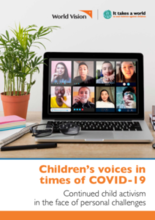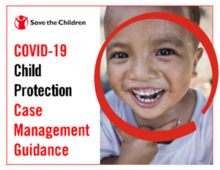Displaying 1691 - 1700 of 4424
This two-module course is aligned to the Guidelines to Strengthen the Social Service Workforce for Child Protection and aims to equip the learner with key strategies to strengthen social service workforce.
This think piece from Innocenti, UNICEF's Office of Research, unpacks what COVID-19 means for data collection efforts on violence against children (VAC).
How We Care is an initiative of Family for Every Child designed for those working with children and families across the world, to help them to learn from other practitioners. These pages showcase a variety of their practice, in order to generate learning and exchange across the Alliance and beyond.
This webpage from the International Labour Organization (ILO) features data on global social protection measures and responses to the COVID-19 crisis.
On this page, you will find stories from people with various disabilities across the globe sharing their experiences with the COVID-19 outbreak and pandemic risk reduction strategies implemented by their governments.
This platform reports how countries are responding to the Covid-19 pandemic in their migration control policies as well as calls by independent monitoring bodies, NGOs, and human rights institutions demanding measures to safeguard migrants and asylum seekers, including unaccompanied migrant children.
This research was conducted in March and April 2020 to explore children and young people’s reflections and perceptions on the COVID-19 outbreak.
This webpage features a selection of materials which the Coalition for Children Affected by AIDS have found to be useful.
This page from the Consortium for Street Children website explores how the COVID-19 pandemic is affecting street-connected children and features documents from the Consortium, including explanatory notes on COVID-19 and street-connected children’s rights, and other resources.
This internal case management guidance aims to provide initial support to child protection staff and partners to adapt their case management programming within the contagious environment of COVID-19.


